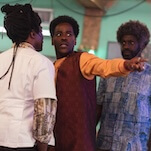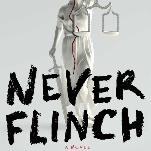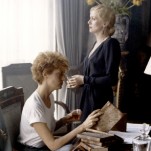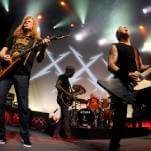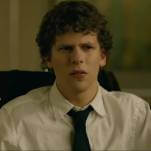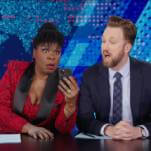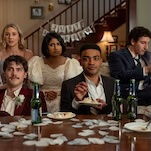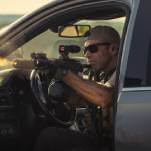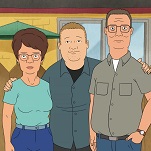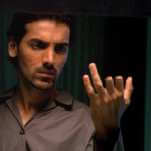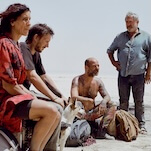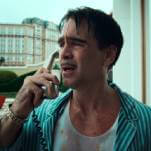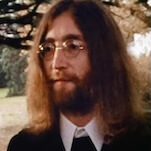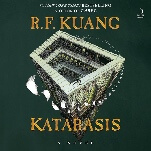SC: Yeah, it can be gross. It can be silly and gross
and offensive, as long as there's sort of a point. Not to deconstruct and have
to explain in graphic detail what the point is, but there's an instinctive
feeling, you understand why someone's made a joke. You can make a joke that, on
the face of it, is racist. Ostensibly someone can appear to be racist, but if
you know you're making a point about race, and not just being pig-headed, then
you can do that. I don't think there's anything outside what comedy can
address. I think some people who don't understand comedy will have a knee-jerk
reaction to some stuff, of course, and will always be offended by it because
they don't understand it or don't want anything to do with it. Some people
react to it in a vociferous way, which is unsophisticated, but there's always
going to be those people out there.
AVC: Have you encountered drama teachers like
the one in Hamlet 2? Are these touchy-feely techniques common?
SC: Yeah, all drama teachers are very effusive, very
demonstrative, very emotionally open, very big, and gesticulate a lot, and are
very physical. Those people don't work in banks, don't work at Chase Manhattan,
and they don't work for pharmaceutical companies. They teach drama, or they may
be theatre directors, or they work in theatre because they're allowed to behave
like that. That's why I love people who are openly gay in theatre, because they
have license to do what they like, and there's a kind of artistic liberal
tolerance thing that goes on. So yeah, there's plenty of people like that,
especially on the West Coast of America, who are navel-gazing, emotionally
self-indulgent, constantly inward-looking people.
AVC: During your drama-school days, were you
ever in a production like this? Do you remember any productions that were
particularly poorly conceived?
SC: Yes. I think it's always funny when you see kids
do Shakespeare. When I was at school, I was in Hamlet. I played Claudius, who's
supposed to be a 60-year-old man, and I was like 18. It's inherently ridiculous
seeing 18-year-old boys with gray beards. That's always funny. And we did Noël
Coward plays, too. To me, most theatre looks ridiculous. I find it very
difficult to do. Personally, if I ever try to do serious stuff, I always end up
looking like an asshole, so I might as well try and do comedy, because I'm good
at that. So I tried to do the Noël Coward thing, and I had to wear a dinner
jacket and smoke a cigarette with a long holder and try to look sophisticated,
but I just looked like a jackass.
AVC: You knew early on that comedy was the way
you were going to go?
SC: Yeah. And then you become comfortable with that,
and you realize that if you're doing your comedy well, then you end up looking
like… If you got the balls to follow something through, you can end up being
the coolest, smartest guy in the room, because you've literally put your ass on
the line.
AVC: Do you have plans to returns to stand-up
comedy?
SC: I did a tour about 10 years ago, and I'm doing a
big live show ["Steve Coogan Is Alan Partridge And Other Less Successful
Characters"] where I do six characters, and I have a live band, and I have
dancers, and I do a vaudeville thing. But it's edgy as well. There's a song I
do called "Everyone's A Bit Of A Cunt Sometimes." That's the last song in the
show. So I do that kind of big show, but I do it in an unorthodox way.
AVC: Given your reputation as an actor who can
create on the spot, are you ever scared off by projects that call on you too
much to improvise? Does the script really have to be there 100 percent?
SC: No, it doesn't have to be there 100 percent, but
improvisation has to be used in a very specific way. The show Curb Your
Enthusiasm,
which I appeared in for an episode, is one where you can use improv to great
ends, but even in Curb Your Enthusiasm, each scene is mapped out quite
specifically, and the intention of each scene is properly constructed before
the improv takes place. Do I get put off? No, I've used improvisation a lot in
the comedy I do, but not actually onscreen. I use improvisation as a writing
tool to help produce material that goes into a script, but a well-crafted
script shouldn't sound scripted, and oftentimes people confuse something that
looks like improvisation for what is actually a very well-written script that
is well-acted. It may seem like improv because it flows quite naturally, and a
little bit of leeway for improvisation is good, but you have to be judicious
with it. So it's good, but sometimes people deify it. You can't improvise your
way out of a paper hat.
AVC: You were on Hamlet 2 for a long time. What
was your involvement before the film actually came to fruition?
SC: I read the script and I liked it and I understood
the comedy. [Writer Pam Brady and writer-director Andrew Fleming] had seen a
lot of my material. They were familiar with all the stuff I had done in
England, and they liked it. So there was a kind of mutual professional respect,
and we used that as a jumping-off point for us to talk crazy about it. There
was a little bit of input from me, and things maybe sort of slightly changed,
but it was pretty broadly what Pam and Andy wrote in the first place. But I
would talk about things like how the character would dress, what his hair would
look like, how he would talk, how he would behave… All that was a part of the
process.
AVC:
A lot of the cast members are very young, kids pulled from Albuquerque, some of
whom had more experience than others. Did it require anything special on your
end to bring their performances along? Were you playing teacher?
SC: Yes, sometimes, though I don't want to overstate
that. Most members of the cast were professional actors, but they were
surrounded by real kids from the local school who rehearsed the dance numbers
with us and were part of the whole thing. So there was a kind of organic
overlap between them. Sometimes you try to make it so people aren't overly
demonstrative with the comedy. Occasionally you'd get in a situation where the
actors are self-consciously trying to be funny, and they stop being funny. That
certainly occurred a few times, I think. You just try and keep your eye on it,
and steer people away from that. But Andy had his eye on that the whole time,
and was pretty successful. And the same with me. But you know, there was one
guy in the cast, Skylar [Astin], who plays the gay student. He actually came up
to me and said a couple times, "Hey, why don't you try this? Why don't you try
that?" And it was like, "Why is this guy telling me what to do? I've been doing
this a long time." But he had good ideas. He was smart.
AVC: How do you go about breaking through in
British comedy culture? Is there a pipeline from alternative comedy clubs to
television? From afar, it seems like there's a farm system in place.
SC: Not really, no. There is a stand-up comedy circuit
in England, which I was a part of a long time ago, and haven't been in for a
good many years. And there's the Edinburgh Festival, which is a platform for a
lot of comics. I went there and won the Perrier Award, which is kind of like
the Fringe Award for comedy, but that was like 16 years ago. That enabled me to become
noticed, and try stuff out there, and be quite avant-garde. But it's fairly
random. There's no real set way of doing things. In some ways, it's sort of
easier than this pilot season you have in America, where people go and try to
do a show and see if it gets picked up. You can have a maverick, odd idea in
England and have more of a chance of getting it on TV, if it's interesting and
different enough.
AVC:
There's an avenue for that?
SC: It's not really an avenue. My route was that I did
a radio show [Radio 4's On The Hour] that became a TV show. Radio is low-cost and
they let you experiment. And then of course that was a way of showing your
wares to the BBC. They would see what you were capable of from the radio show
and they'd give you a shot at a TV show. There's very little science involved.
There's no kind of market- or audience-testing or anything like that.
[Television executives] just read the reviews and pick up a vibe. They might
look at the viewing figures, but they don't really. I did a show called The
Day Today
which had a very devoted, underground cult following for a while. The viewing
figures were not big, but the BBC didn't really care, because there was the
perception that it was a really good, quality show. Sometimes a show gets put
out because a guy who's in the department goes, "I like your stuff. You can do
a show." If the general perception is that it's good quality, you'll get a
second series as well. There's not this bottom line of looking at the numbers
all the time.
AVC: But the series themselves are usually brief,
and then you have to do something different.
SC: Yeah, but for us, it didn't really matter. Fawlty
Towers
did, like, 12 episodes. It doesn't matter. No one goes, "Oh, if only they'd
done 50." It's funny and it has a life there, and people value it, and it lives
out there in its own universe. And it will for a long time. You don't get rich
from it, that's for sure. You don't get rich from doing those kinds of shows.
What you hope for is to make something really special that's really loved by
the people who see it.
AV: The film Tristram Shandy plays off your persona
and your reputation in the tabloids. Were you comfortable doing that? Does
comedy have a way of defusing things?
SC: It does for me. With anything in your life which
potentially makes you vulnerable, if you try to react to the press and defend
yourself, and kind of put up the shutters and go [Whimpers.] "Leave me alone,"
you end up inviting more of it. Instead, you can co-opt it and put it toward
what you do. I don't give a shit. I'll fold it all in and use it. So if
something happens to me that I think is really bad, I'm just thinking, "Oh, that's
interesting. That could be useful. That could be funny." And it sort of neutralizes
it as a threat.
Even if I screw up in my personal life, as long as
I'm not destroying myself, I just think, "Okay, I screwed up." I'm not Mother
Theresa. And people are sort of obsessed with trying to protect a certain kind of
image. I'm not like a politician that goes around talking about family values.
And I can't get fired from being a funny person because I did something that
most people are disapproving of. I think people are just obsessed with this
morality that people perceive as being the right and wrong way of doing stuff.
And it does make me vulnerable sometimes, but I like putting that in there and
just using stuff like that. I talked to [Tristram director] Michael
Winterbottom and said, "We should just put that stuff in there." It's just a different
way of dealing with it, rather than the normal knee-jerk impulse to try to
fight back in an aggressive way. It's like, if you're driving your car and
someone winds the window down and gives you the finger and calls you an
asshole, instead of giving him the finger back and calling him an asshole back,
you just pull a funny face, and he doesn't know how to react to that, because
you're using different rules. He doesn't know how to come back at you. You pull
a funny face that he doesn't understand. So you confuse him, and therefore you
win.














